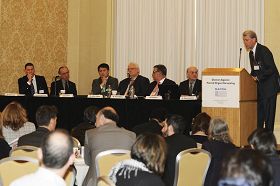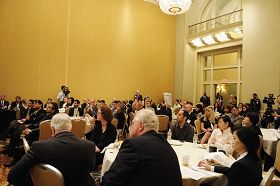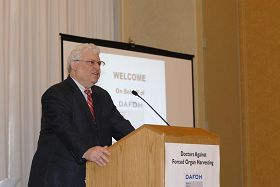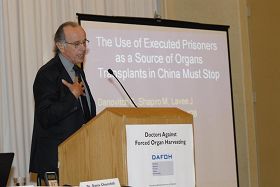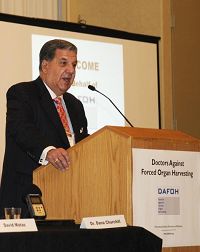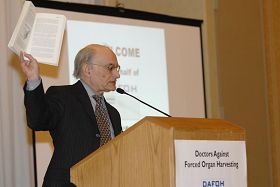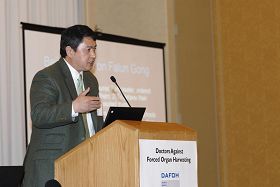This article was first published in May 2011.
(Minghui.org)
China’s forced organ harvesting is an inescapable responsibility for the global transplant community, including transplant patients, voiced a panel of experts in Philadelphia on May 1. Held alongside the 2011 American Transplant Congress, the panel discussion, titled Global Transplant Community at Medical Crossroads, saw a hotel ballroom full of participants with some standing at the door.
Hosted by the NGO Doctors Against Forced Organ Harvesting (DAFOH), the panel raised the question of how the transplant community in the West should respond to China’s use of organs harvested from executed prisoners and unidentified sources, an unacceptable practice according to the international medical ethical standards.
A panel of experts in the discussion, from left to right: spokesperson Dr. Damon Noto of Doctors Against Forced Organ Harvesting, Dr. Gabriel Danovitch, Dr. Erping Zhang, Dr. Arthur Caplan, Dr. Eric Goldberg, and Lawyer David Matas.
Discussion venue. Many attendees of the 2011 American Transplant Congress attended the panel discussion.
Dr. Arthur Caplan, Emanuel and Robert Hart Professor of Bioethics and Philosophy, Director, Center for Bioethics, and Chair, Department of Medical Ethics, University of Pennsylvania
Dr. Gabriel Danovitch, medical director for the Kidney & Pancreas and professor at the University of California at Los Angeles
Dr. Eric Goldberg, senior medical director of ICON, a global clinical research company
Human rights lawyer David Matas, who co-authored the book, "Bloody Harvest: Organ Harvesting from Falun Gong Practitioners in China," with David Kilgour.
Dr. Erping Zhang, spokesperson for Falun Gong, at the panel discussion session held on May 1 in Philadelphia at the American Transplant Congress.
Pharmaceutical Companies
International pharmaceutical companies have played a major role in helping to perpetuate the unethical practice of organ harvesting through their drug trials in China, according the speakers at the panel discussion.
Dr. Eric Goldberg, senior medical director of ICON, a global clinical research company, pointed out that the low cost of developing clinical trials in China—roughly 15 percent of that in the United States—makes it very appealing to the pharmaceutical companies that try to develop drugs with a limited budget in a recessive economic environment, adding that China also offers the companies the extra benefit of speeding up the drug development process by having a large number of patients and fewer regulations.
“The issues that we deal with at the FDA, the EMA, [and] Health Canada, they just don’t exist in China. There’s much less scrutiny” Dr. Goldberg said.
Yet while many international pharmaceutical companies have carried out research in China, not many are ready to acknowledge their roles on the issue of China’s unethical organ harvesting, according to the panel’s speakers.
The well-known human rights lawyer David Matas, who co-authored the book, Bloody Harvest: Organ Harvesting from Falun Gong Practitioners in China, with David Kilgour, singled out the Swiss pharmaceutical company Roche as an example.
According to Matas and Kilgour’s investigation in the years 2002-2006 there were 41,500 transplant operations for which the Chinese regime could not provide a source. They believe detained Falun Gong practitioners are the most likely source for these organs.
While being questioned about the issue of unidentified organ sources in relation to its transplant patients in China, Roche’s response, as Mr. Matas showed in his slide on Sunday’s panel discussion, was “Roche is not in charge of the supply of organs … Roche is not entitled to know the source of transplant organs.”
Roche’s former CEO and present chairman of the board of directors said, “In China there were no ethical or cultural stoppages for transplant medicine,” according to Mr. Matas, who noted that the statement is an acknowledgement of Roche’s knowingly conducting clinical trials in China while not showing concern for the unethical practices behind them.
Ignorance on the part of the companies about the sources of transplanted organs is not an acceptable reason in the eyes of the panel’s speakers.
“They can’t say they don’t know where the organ came from. They can’t say they don’t care where the organ came from” said Dr. Caplan, professor of Bioethics at the University of Pennsylvania in Philadelphia, who was one of the panel’s speaker and is also the keynote speaker of the 2011 American Transplant Congress.
Roche won two shame prizes in 2010: the Public Eye Swiss Award and the Public Eye People Award for “irresponsible corporate behavior.” A Dutch investment bank Triodos disinvested from Roche in September 2010.
Mr. Matas reported a watch list of multinational pharmaceutical companies that have conducted clinical trials on organ transplant anti-rejection drugs in China, including Wyeth (now part of Pfizer), Novartis, Roche, and Astella. These trials were performed on patients who receive organs harvested in China.
Last month, on the issue of China’s unethical organ harvesting, The Epoch Times tried to solicit comments from a number of pharmaceutical companies, and four companies are on Mr. Matas’s watch list. Both Isotechnika, a biopharmaceutical company based in Alberta, Canada, and Norvatis, a Basel-based pharmaceutical company, have responded.
Professional Responsibilities
The panel’s speakers unanimously agreed that it’s high time for the global transplant community to step up in ending the unethical organ harvesting practice in China.
The lack of scrutiny in China doesn’t exempt transplant medical professionals from their responsibility to keep up with the international standard in medical ethics.
Another panel speaker, Dr. Gabriel Danovitch, medical director for the Kidney & Pancreas Transplant Program at the Department of Medicine of UCLA, said the global transplant community has power to effect a positive change on the Chinese government. “We don’t have cruise missiles or tanks. But we do have some power by virtue of professional acceptance.”
He expressed deep concerns about the lack of critical eyes on China in the transplant community. Leading medical journals’ editorial boards keep accepting research papers from China on organ transplant.
An example Dr. Danovitch used in his slides was an article published in the American Journal of Transplantation last year, which has a sentence that provides no critical scrutiny on China’s dubious organ harvesting practice.
“The Chinese procedure also has the advantages of being very accessible and relatively inexpensive as compared to Western centers. … It is also possible to procure an organ in a relatively short time,” according to Dr. Danovitch.
He encouraged the western transplant society to use the power to make a positive change in China. “If we don’t exercise it, we’ll fritter it away,” he said.
Dr. Goldberg gave a personal testimony of how he exercised his professional power. After learning about the organ-harvesting situation in China, he went to persuade his company not to include China in its clinical trials.
“Fortunately for me personally and fortunately for the world, I received the backing that I needed,” said Dr. Goldberg, who was very happy for and proud of his company—ICON.
“There are commercial implications here of a multibillion dollar world famous company to do the right thing, so I became proud of that,” he said.
Dr. Erping Zhang, spokesperson of Falun Gong and one of the panel’s speakers, emphasized the importance for transplant professionals to take full responsibility on the issue.
“History will not only judge on what we have done, but also on what we didn’t do while we could,” said Dr. Zhang.
Category: Organ Harvesting


